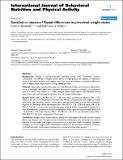| dc.description.abstract | Background: Obesity is disproportionately prevalent among many racial/ethnic minority communities. The efficacy of weight control efforts in these groups may depend on individual's ability to accurately perceive their weight status. We examined whether racial/ethnic differences exist in weight status misperception among overweight adults. Methods: Nationally-representative data from the National Health and Nutrition Examination Survey (NHANES) 1999–2002 were examined. Participants included overweight and obese adult men (n = 3115) and women (n = 3437). Weight status misperception was identified among respondents who self-reported being "about the right weight/underweight." Results: Blacks (OR = 2.06, 95% CI: 1.71, 2.54) were twice as likely and Hispanics (OR = 1.70, 95%CI: 1.33, 2.17) were 70-percent more likely than Whites to misperceive their weight, in models adjusted for age, education, income, marital status, self-reported health, and self-reported medical diagnosis of overweight. Black overweight (OR = 2.03, 95% CI: 1.26, 3.26) and obese (OR = 3.56, 95% CI: 1.57, 8.11) women were considerably more likely to exhibit misperception compared to their White female counterparts. Odds of misperception were higher among overweight Black (OR = 2.20, 95%CI: 1.54, 3.15), Hispanic (OR = 1.89, 95% CI: 1.30, 2.75), and obese Black men (OR = 2.84, 95% CI: 1.54, 5.22), compared to White men. Conclusion: Weight status misperceptions among the overweight are more common among Blacks, and Hispanic men. The persistence of racial/ethnic differences after adjustment for medical diagnosis of overweight may suggest some resistance to physician weight counseling. Identifying strategies to correct weight status misperceptions status may be necessary to ensure the efficacy of clinical and public health obesity interventions conducted among these groups. | en_US |


